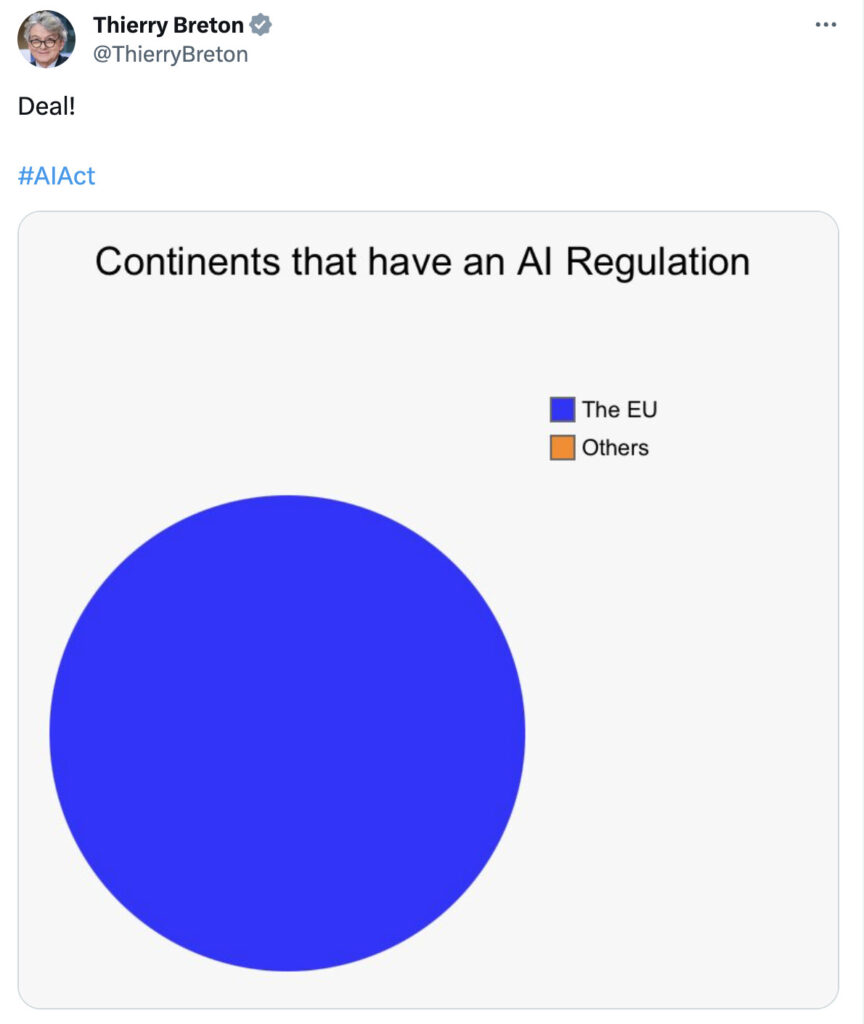Since December 8, the European Union has been the first major economic power to regulate artificial intelligence, within the framework of its AI Act. After months of reflection and hours of debate, what has changed in this already criticized text?
In France, there will soon be supervision of the development and use of artificial intelligence, while this sector is booming since the appearance of ChatGPT in November 2022. On the night of December 8 to 9, 2023, the Commission European Union has reached an agreement on the AI Act, a text which aims to regulate services like ChatGPT or Midjourney. The EU promises that its AI Act is not there to slow down innovation, but to ensure that these services remain controllable.
If the European Union has become an international reference in terms of regulation of the tech sector (GDPR, Digital Services Act, DMA, USB-C on all smartphones, etc.), the AI Act divides.
Some criticize Europe for having regulated for the sake of regulating, or for having legislated too early while the artificial intelligence industry is still in its infancy. Others consider that the text does not tackle essential subjects, and much more critical for people’s rights, such as facial recognition. There have been numerous criticisms since December 9.

Facial recognition, an area of disagreement
Concretely, this is what the AI Act changes:
- AI systems will now be classified according to the risks they present, thanks to a rating system determining their impact on society. These notes are provided by the system suppliers, who must display them for each service offered.
- High-risk AI, used in security or surveillance, is subject to very strict regulations.
- Very high-risk AI, which uses biometric recognition or affects fundamental rights (social rating, for example), is prohibited.
- Companies that offer AI must commit to rules on transparency, non-discrimination and environmental responsibility.
- Human beings must be able to moderate AIs.
- Some tools will have to explicitly tell their users that they are not talking to a real person.
Reaching an agreement on the AI Act was not easy, due to the intense lobbying of large tech companies, who did everything to prevent the European Union from putting obstacles in their way. European groups, like Mistral, are among the most worried. They criticize Brussels for leaving the field open to American companies by regulating the European sector too quickly, while AI is still in its infancy. An idea shared by Xavier Niel who launched his organization Kyutai, which aims to offer France an alternative to OpenAI.
Another problem has particularly stirred up debate: facial recognition. Software can find a person in a few seconds using artificial intelligence, which some want to ban. The final text prohibits real-time facial recognition as well as the use of biometric technologies to analyze emotions, but leaves room for maneuver for governments. As reported by Mediapart, France has particularly lobbied to be able to use facial recognition within the framework of “terrorist or specific, substantial and imminent threats”particularly to find missing people.


The AI Act probably in force in 2025
What will the AI Act change in our lives? Nothing for the moment. An agreement was reached by the European Commission, but it must now be examined by the European Parliament and representatives of the 27 member countries. The possibility of States blocking it exists, as does the possibility of a profound evolution of the text between now and its implementation by 2025. By then, the United States will probably have regulated its own use of artificial intelligence, as President Joe Biden wishes.
In the meantime, Europe remains generally lagging behind in terms of artificial intelligence. Despite the proliferation of large-scale initiatives, the United States and Asia remain the most ambitious. In certain cases, the European Union is also served secondarily, since developers of generative AI must adapt it to European rules. This is particularly the case of Google Gemini, announced for early 2024 in France.
Subscribe for free to Artificielles, our newsletter on AI, designed by AIs, verified by Numerama!
